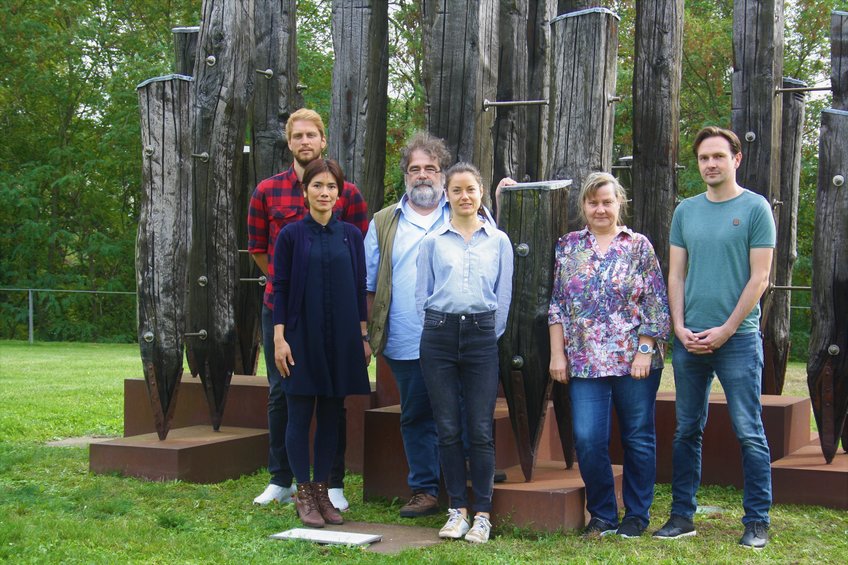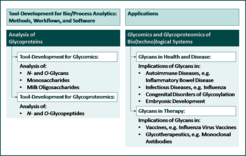
Bio/Process Analytics
Key topics of the Max Planck Institute for dynamics of complex technical systems (MPI-DCTS) are process design, control and optimization. At the Bioprocess Engineering group headed by Prof. Reichl these topics are investigated for a deeper understanding with respect to cell culture-based production of biologicals (USP & DSP), the monitoring and control of biogas plants, and the characterization of microbial communities.
To address topics at the molecular level, extensive and advanced bioanalytical tools are indispensable. The bio/process analytics team at the MPI-DCTS, headed by Dr. Erdmann Rapp, is dealing with qualitative and quantitative proteomics and the analysis of post translational modifications (PTM) - in particular glycomics and glycoproteomics.
Overview

Posttranslational modifications play a crucial role in the function of many proteins. Analysis of glycosylation, which is one of the most frequent protein modifications found in all domains of life, is therefore of particular interest. To gain a deeper understanding of biological implications of glycans and glycoproteins, our group develops methods, workflows and software tools for the analysis of N- and O-glycans, mono- and oligosaccharides (glycomic approach) as well as N- and O-glycopeptides (glycoproteomic approach). The core technologies we use for these approaches are liquid chromatography, mass spectrometry, and capillary (gel) electrophoresis. Together with the developed software tools this enables: 1) in-depth structural N- and O-glycan analyses (including analysis of structural isomers and glycan modifications); 2) high-throughput glycan profiling (i.e. relative quantification of N- and O-glycans), and 3) site-specific analysis of N- and O-glycopeptides (micro- and macroheterogeneity). Over the last years we have established several glycomic and glycoproteomic workflows for analysis of a broad range of applications from bioprocess engineering and biopharmaceutical/vaccine production to clinical studies.
Supported by:
Currently funded grant programs:
Deutsche Forschungsgemeinschaft (DFG, German Research Foundation):
“The concert of dolichol-based glycosylation: from molecules to disease models”
(Grant Agreement No. FOR2509)
Started: 01.11.2017
Collaborations:
Otto von Guericke University Magdeburg, Institute of Process Engineering,
Bioprocess Engineering
(Dr. Dirk Benndorf)
German Primate Center, Infection Biology Unit, Göttingen, Germany
(Prof. Dr. Stefan Pöhlmann)
Hannover Medical School (MHH), Institute of Clinical Biochemistry, Hannover, Germany (Prof. Dr. Rita Gerardy-Schahn)
Hannover Medical School (MHH), Institute of Clinical Biochemistry, Hannover, Germany (Prof. Dr. Falk F. R. Büttner)
Hannover Medical School (MHH), Institute of Clinical Biochemistry, Hannover, Germany
(Dr. Birgit Weinhold)
Hannover Medical School (MHH), Institute of Clinical Biochemistry, Hannover, Germany
(Dr. Anja Münster-Kühnel)
Institute for Biotechnology and Helmholtz-Institute for Biomedical Engineering,
RWTH Aachen University, Aachen, Germany
(Prof. Dr. Lothar Elling)
Max Planck Institute of Colloids and Interfaces,
Department of Biomolecular Systems, Potsdam, Germany
(Prof. Dr. Peter H. Seeberger)
Center for Proteomics and Metabolomics, Leiden University Medical Center,
Leiden, The Netherlands
(Prof. Dr. Manfred Wuhrer)
Institute for Glycomics, Gold Coast Campus, Griffith University,
Queensland, Australia
(Prof. Dr. Daniel Kolarich)
Faculty of Pharmacy and Biochemistry, University of Zagreb, and
Genos Glycoscience Research Laboratory,
Zagreb, Croatia
(Prof. Dr. Gordan Lauc)
Institute of Experimental Internal Medicine, Otto-von-Guericke University Magdeburg, Magdeburg, Germany
(PD Dr. Thilo Kähne)
Centre for Organismal Studies (COS), University Heidelberg,
Heidelberg, Germany
(Prof. Dr. Joachim Wittbrodt)
Centre for Organismal Studies (COS), Department of Cell Chemistry, University Heidelberg,
Heidelberg, Germany
(Prof. Dr. Sabine Strahl)
Center for Child and Adolescent Medicine, Department Kinderheilkunde I,
Heidelberg, Germany
(PD Dr. rer. nat. Christian Thiel)
New England Biolabs,
Ipswich, MA, United States
glyXera GmbH
Magdeburg, Germany
